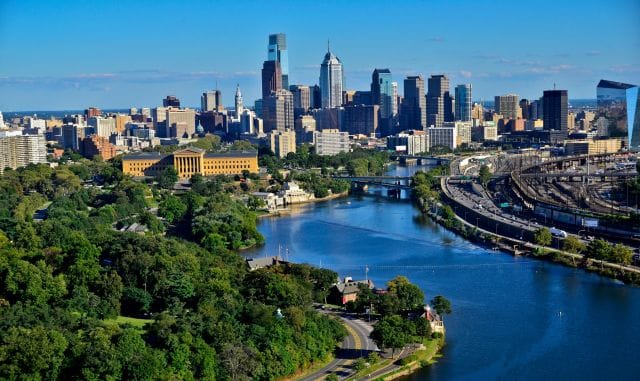Episodes: Architecture as history

Everywhere you walk in Philadelphia, the floor creaks a little bit.
This was true of the ancient, renovated row house I stayed in for the weekend I was there. It was true of the many little stores I stopped into. And it was true of the old university building where I spoke. You couldn't move without the floor wheezing a little, reminding you that it was there and had been there a lot longer than you had.
I find something comforting about this, about the weird permanence of architecture in the face of history. Obviously, that's not true all of the time. If humans were wiped from the face of the planet, all of our structures would be taken almost as quickly. And it's not as if we do a great job of preserving everything we've built. But the thing you get in a truly old city is unlike anything you might find in the newer cities where most of the US population lives.
There's something about walking on a spot and hearing it and knowing that there were so many people before you who stepped there, in very different circumstances, that at one time, it was beautiful and new, and it didn't sag. And then, gradually, it did.
I sometimes think about when I was a kid, and my family would go to the mall. We'd park our car, and my dad would say it was up to my sister and me to remember where the car was, so we should look for landmarks. Inevitably, I would point out the cars we parked next to, and he would say those weren't very good landmarks, because the cars could change. He'd point to light poles, or buildings, or other markers that would hopefully not change between our going in the mall and leaving.
But I would always wonder in those moments, what if. What if the Pizza Hut ceased to exist in the 90 minutes I spent looking at computer games I couldn't afford at Software, Etc.? What if the light poles crumbled to dust? What if we left the mall and found a post-apocalyptic landscape?
I found myself laying in bed in the row house, imagining the many, many people who'd lived in that space before I happened to sleep in it for a few nights, trying to feel them around me. Lacking the ability to manipulate space-time, I failed in this goal, but it still felt worthwhile, to try to tap into that vibe.
I don't know what this is supposed to be, I'll freely admit, beyond the thought that the first sentence might be a good opening for a TinyLetter. But I've always been drawn to the old, more than the new, to the things that feel like they might last and are filled with ghosts, instead of the things that are right there in front of me. Maybe that's a poor fit for someone who primarily writes about TV (a medium that devours its own history), but I find it impossible to step into places and not try to find their older selves, the places where the floorboards groan in ways they must have for decades.
--
Episodes is published daily, Monday through Friday, unless I don't feel like it. It is mostly about television, except when it's not. Suggest topics for future installments via email or on Twitter. Read more of my work at Vox Dot Com.



